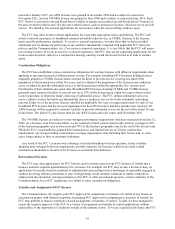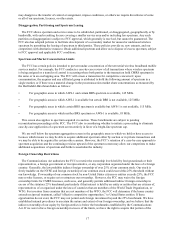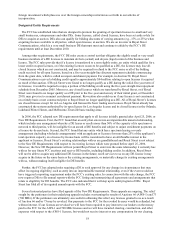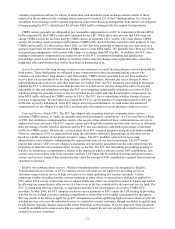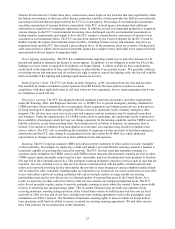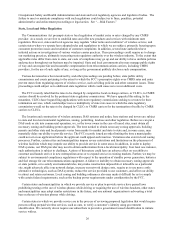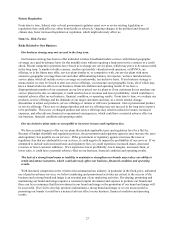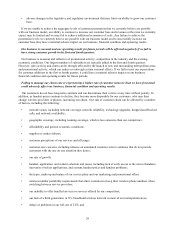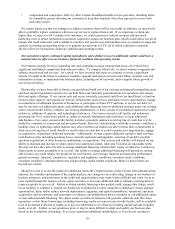Metro PCS 2009 Annual Report Download - page 34
Download and view the complete annual report
Please find page 34 of the 2009 Metro PCS annual report below. You can navigate through the pages in the report by either clicking on the pages listed below, or by using the keyword search tool below to find specific information within the annual report.22
Regulatory fees. We are obligated to pay certain annual regulatory fees and assessments to support FCC wireless
industry regulation, as well as fees supporting federal universal service programs, number portability, regional
database costs, centralized telephone numbering administration, telecommunications relay service for the hearing-
impaired and application filing fees. These fees are subject to change periodically by the FCC and the manner in
which carriers may recoup these fees from customers is subject to various restrictions.
Equal access. At present, CMRS carriers are exempt from the obligation to provide equal access to interstate long
distance carriers. However, the FCC has the authority to impose rules requiring unblocked access through carrier
identification codes or 800/888 numbers to long distance carriers so CMRS customers are not denied access to their
chosen long distance carrier, if the FCC determines the public interest so requires. Our customers have access to
alternative long distance carriers using toll-free numbers.
Customer proprietary network information (CPNI). FCC rules impose restrictions on a telecommunications
carrier’s use of customer proprietary network information, or CPNI, without prior customer approval, including
restrictions on the use of information related to a customer’s location. CMRS carriers must take reasonable measures
to discover and protect against pretexting and, in enforcement proceedings, the FCC will infer from evidence of
unauthorized disclosures of CPNI that reasonable protections were not taken. The FCC has imposed substantial fines
on certain wireless carriers for their failure to comply with the FCC’s CPNI rules. The FCC previously conducted a
broad scale investigation into whether CMRS carriers are properly protecting the CPNI of their customers against
unauthorized disclosure to third parties and may conduct further investigations in the future. The FCC also is
seeking comment on additional CPNI regulations.
Congress and state legislators also have passed and may pass legislation governing the use and protection of
CPNI and other personal information. For example, Congress enacted the Telephone Records and Privacy Protection
Act of 2006, which imposes criminal penalties upon persons who purchase without a customer’s consent, or use
fraud to gain unauthorized access to, telephone records. In addition, certain states have enacted, and other states in
the future may enact, legislature relating to customer personal information. The recent and pending legislation (if
enacted) may require us to change how we protect our customer’s CPNI and other personal information.
Services to persons with disabilities. Telecommunications carriers are required to make their services accessible
to persons with disabilities. These FCC rules generally require service providers to offer equipment and services
accessible to and usable by persons with disabilities, if readily achievable, and to comply with FCC-mandated
complaint/grievance procedures. These rules are largely untested and are subject to interpretation through the FCC’s
complaint process. While these rules principally focus on requirements that must be met by the manufacturers of
wireless equipment, we are required to have a certain percentage of our handsets be hearing aid compatible and we
have annual reporting requirements. In addition, we are required to offer these hearing aid-compatible wireless
phones for each air interface we provide. As a result, this requirement may limit our ability to offer services using
new air interfaces other than CDMA 1xRTT, such as dual mode CDMA/LTE handsets, may limit the number of
handsets we can offer, or may increase the costs of handsets for those new air interfaces.
Backup power requirements. In October 2007, in light of Hurricane Katrina and other such natural disasters, the
FCC adopted rules which, if they had taken effect, would have required us to maintain emergency backup power for
a minimum of twenty-four hours for certain of our equipment that is normally powered from local commercial
power located inside mobile switching offices, and eight hours for certain of our equipment that are normally
powered from local commercial power and at other locations, including cell sites and DAS nodes. Various aspects of
the rules were challenged in court and before the OMB. As a result, the rules have not taken effect and are not being
enforced, and the FCC has indicated that it plans to seek comment on revised backup power rules applicable to
wireless providers. In addition, if we were required to secure additional state or local permits or authorization, it
could delay the construction of any new cell sites or distributed antenna systems, or DAS systems, and launch of
services in new metropolitan areas.
Siting issues. The location and construction of wireless antennas, DAS systems and nodes, base stations and
towers are subject to FCC and Federal Aviation Administration, or FAA, regulations, federal environmental
regulations, and other federal, state, and local regulations. The FCC has adopted rules that are intended to expedite
siting decisions by state and local authorities, but the rules are subject to continuing legal challenges. With respect
to AWS-1 sites, we must notify the FAA when we add AWS-1 frequencies to existing sites that already have been
determined not to be a hazard to air navigation by the FAA. Antenna structures used by us and other wireless
providers also are subject to FCC rules implementing the National Environmental Policy Act and the National






